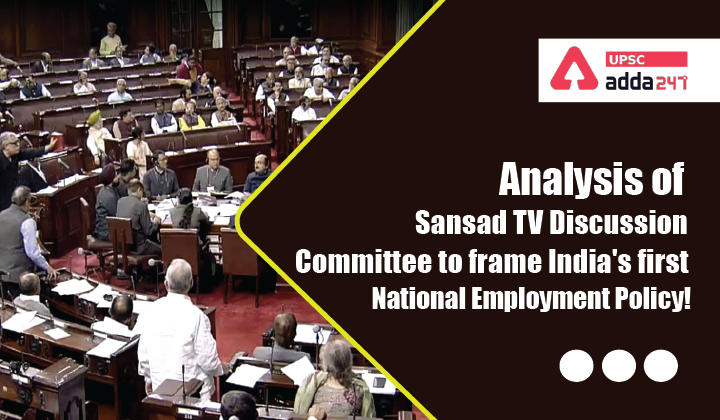Table of Contents
”G.S. Paper – 3: Government Policies & Interventions, Employment, Growth & Development, Industrial Growth, Inclusive Growth, Social Empowerment”
Context
The government will soon set up a committee to frame India’s first National Employment Policy with an aim to significantly push up employment generation in the country.
Background
Even after 19 months since the pandemic first hit India in March 2020, the country’s overall employment is lower than pre-pandemic levels while at least five million youth are added to the country’s 450-million workforce every year.
Not a Sudden Plan
- The proposal to bring in a dedicated National Employment Policy was first mooted in 2008.
- An inter-ministerial group during the United Progressive Alliance regime had examined the proposal but nothing concrete emerged.
- The idea finally took some shape at the first meeting of the BRICS employment working group in 2016, following which the NDA government started work on it.
- However, even that could not progress much.
- Last year, a group of ministers led by then social justice & empowerment minister Thawar Chand Gehlot, had suggested that the National Employment Policy should lay out a sectoral roadmap with incentives for employment generation.
Need of the Hour
The renewed focus on the country’s first National Employment Policy is very important after the Covid-19 pandemic took away millions of jobs, raising the overall unemployment rate to alarming levels.
Aim of The policy
- It is expected to take into account the jobs estimated to be created under the production-linked incentive (PLI) scheme across a dozen sectors besides the rising number of gig workforce and platform workers in the country.
- The policy will have twin objectives of creating an enabling environment for attracting new enterprises and industries to generate employment opportunities while improving the skill sets of the existing workforce to make it employable and competent enough to match global standards with special emphasis on increasing the headcount of female workforce.
- The NEP will draw a broad road map for improving job opportunities in the country.
- Ways to improve the skills sets of the Indian workforce to match with the international standards will also be addressed in the policy.
MSME’s Demands
- As per the various surveys of the National Sample Survey (NSS), the MSME sector has been creating more jobs in the rural and urban areas across the country.
- Hence, the MSME fraternity being a significant stakeholder in this matter has urged the government to consider including employment-based incentives whilst framing the National Employment Policy.
- This will be not only encouraged and flourish small businesses but empower the country’s socio-economic growth by generating grassroots employment.
Expected Rollout of the Policy
- The Ministry of Labour and Employment is likely to give shape to the National Employment Policy (NEP) by December 2021 following the implementation of four labour codes and the completion of four major surveys, including one migrant worker.
- The first draft is expected to be placed presented by FY22-23 and will be derived from data from employment surveys.
About the four Labour codes
- It will mark the amalgamation of 44 Central labour laws into four broad codes on wages, industrial relations, social security, and safety and working conditions.
- Labour is a concurrent subject under the Constitution of India and therefore it will be effective once both the Centre and states notify rules under these four codes to make them the laws of the land in their respective jurisdictions
Conclusion
For Ease of Doing Business and Ease of Living, NEP is important. This is important to capture the sector-wise and region-wise labour market dynamic. Thus, a proposed government committee to draft a national employment policy is expected to come out with a proper roadmap to increase employment.



 TSPSC Group 1 Question Paper 2024, Downl...
TSPSC Group 1 Question Paper 2024, Downl...
 TSPSC Group 1 Answer key 2024 Out, Downl...
TSPSC Group 1 Answer key 2024 Out, Downl...
 UPSC Prelims 2024 Question Paper, Downlo...
UPSC Prelims 2024 Question Paper, Downlo...
